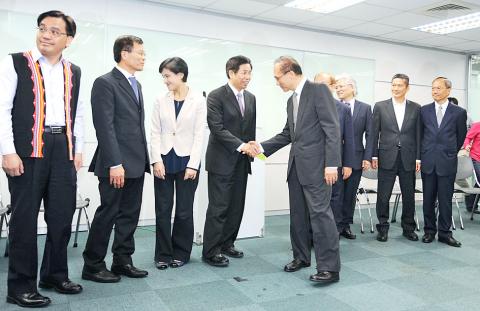Premier-designate Lin Chuan (林全) yesterday introduced another 14 future Cabinet members, including the ministers of education, culture, the Hakka Affairs Council and the Council of Indigenous Peoples and the director of the National Palace Museum.
Deputy Taichung Mayor Pan Wen-chung (潘文忠) was announced as the future minister of education. Democratic Progressive Party (DPP) Legislator Cheng Li-chun (鄭麗君) has been tapped for minister of culture.
Chimei Museum chief operating officer Lin Jeng-yi (林正儀) has been appointed director of the National Palace Museum. Kaohsiung Deputy Mayor Lee Yung- te (李永得) — who served as minister of the then-Council of Hakka Affairs from 2005 to 2008 — was appointed to head the Hakka Affairs Council, which received an administrative upgrade in 2012 and had its name changed.

Photo: CNA
Also reappointed was New Taipei City Councilor Icyang Parod of the Amis people, who was Council of Indigenous Peoples minister from 2007 to 2008.
Ming Chuan University dean of social sciences Wu Hsin-hsing (吳新興) has been appointed to head the Overseas Community Affairs Council; National Chengchi University public administration professor Chu Tzer-ming (朱澤民) is to head the Directorate-General of Budget, Accounting and Statistics; and Jay Shih (施能傑), who is also a professor of public administration at National Chengchi University, is to oversee the Directorate-General of Personnel Administration.
Eight deputy ministers were also announced.
As for the minister of transportation and communications and the minister of the interior, Lin Chuan said those announcements had to be postponed because of the time needed for consideration by people who have been asked.
Lin Chuan said that the remaining posts would be announced before the end of the month.
Lin Chuan said he had prioritized problemsolving as a trait for Cabinet memebers, so having “rising stars” in the Cabinet was a secondary concern — many of the future Cabinet members so far are deputy mayors of local governments, not considered rising stars — as was gender proportionality, age and where members are from.

Taiwan has received more than US$70 million in royalties as of the end of last year from developing the F-16V jet as countries worldwide purchase or upgrade to this popular model, government and military officials said on Saturday. Taiwan funded the development of the F-16V jet and ended up the sole investor as other countries withdrew from the program. Now the F-16V is increasingly popular and countries must pay Taiwan a percentage in royalties when they purchase new F-16V aircraft or upgrade older F-16 models. The next five years are expected to be the peak for these royalties, with Taiwan potentially earning

STAY IN YOUR LANE: As the US and Israel attack Iran, the ministry has warned China not to overstep by including Taiwanese citizens in its evacuation orders The Ministry of Foreign Affairs (MOFA) yesterday rebuked a statement by China’s embassy in Israel that it would evacuate Taiwanese holders of Chinese travel documents from Israel amid the latter’s escalating conflict with Iran. Tensions have risen across the Middle East in the wake of US and Israeli airstrikes on Iran beginning Saturday. China subsequently issued an evacuation notice for its citizens. In a news release, the Chinese embassy in Israel said holders of “Taiwan compatriot permits (台胞證)” issued to Taiwanese nationals by Chinese authorities for travel to China — could register for evacuation to Egypt. In Taipei, the ministry yesterday said Taiwan

Taiwan is awaiting official notification from the US regarding the status of the Agreement on Reciprocal Trade (ART) after the US Supreme Court ruled US President Donald Trump's global tariffs unconstitutional. Speaking to reporters before a legislative hearing today, Premier Cho Jung-tai (卓榮泰) said that Taiwan's negotiation team remains focused on ensuring that the bilateral trade deal remains intact despite the legal challenge to Trump's tariff policy. "The US has pledged to notify its trade partners once the subsequent administrative and legal processes are finalized, and that certainly includes Taiwan," Cho said when asked about opposition parties’ doubts that the ART was

If China chose to invade Taiwan tomorrow, it would only have to sever three undersea fiber-optic cable clusters to cause a data blackout, Jason Hsu (許毓仁), a senior fellow at the Hudson Institute and former Chinese Nationalist Party (KMT) legislator, told a US security panel yesterday. In a Taiwan contingency, cable disruption would be one of the earliest preinvasion actions and the signal that escalation had begun, he said, adding that Taiwan’s current cable repair capabilities are insufficient. The US-China Economic and Security Review Commission (USCC) yesterday held a hearing on US-China Competition Under the Sea, with Hsu speaking on